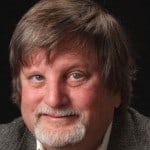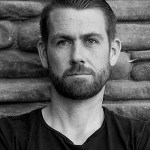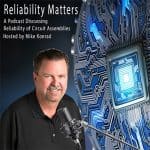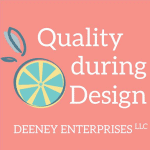
Adhesives
Abstract
Kirk and Fred discuss the reliability issues around using adhesives to attach mechanical assemblies.
ᐅ Play Episode
Your Reliability Engineering Professional Development Site

Kirk and Fred discuss the reliability issues around using adhesives to attach mechanical assemblies.
ᐅ Play Episode
by Greg Christensen Leave a Comment

This episode features Ecotrak CEO Matt Singer and COO Mike Snyder (co-founder) sharing the journey story including…
Thank you Matt and Mike for joing CMMSradio to record this episode to share your Ecotrak journey.
by Christopher Jackson Leave a Comment

Chris and Fred respond to a question asked by one of our listeners … who is wondering about the number of ‘starts’ and ‘stops’ on electrical and mechanical systems when it comes to characterizing reliability.
ᐅ Play Episode
by Greg Christensen Leave a Comment

Thank you, George Williams of ReliabilityX, for joining CMMSradio to discuss the upcoming course offering on CMMS selection and utilization at the University of Wisconsin-Madison (in person or online). A much-needed course to help maintenance professionals thrive when it comes to their CMMS journey. Get the process and reasons behind the process right before you select a CMMS. Lots of insights in this episode including some practical views on…
Having a course run by a Bonafide maintenance and reliability professional, like George Williams, is what’s needed to bridge common gaps maintenance professionals deal with across teams when they get this CMMS selection part wrong, or they have to adopt a system already in place (totally possible). There are healthy debates, and the interactive nature of the course assures everyone is on the same page and learning these principals to selecting and utilizing a CMMS platform.
by Greg Christensen Leave a Comment

released version of FlowPath that creates easier CMMS launch for clients that do not want to start with a complicated and costly enterprise system. We also talked about customer data – FlowPath allows clients access to their data – and the upcoming exhibit at IFMA World Work Place in Denver, Colorado Septermber 27 – 29, 2023 – Be sure to visit FlowPath at booth 954. Get a demos set: https://www.getflowpath.com/cmmsradio
by Robert Allen Leave a Comment

Reliability engineers should have a clear understanding of how customer needs link to product requirements. Product requirements that have the most impact on customer needs should be considered in your design failure modes and effects analysis (DFMEA). This webinar will review the quality function deployment methodology (QFD), which identifies critical-to-quality (CTQ) requirements and supports requirements validation. We will also cover how the relative importance of CTQs can be used to determine DFMEA severity criteria.
[Read more…]
by Mike Konrad Leave a Comment

This episode is a little different in two ways. First, I didn’t record it in my studio. I recorded it at the SMTA Pan Pacific strategic Electronics symposium, affectionately known as PanPac, in beautiful Maui Hawaii.
Each year, I record a Reliability Matters podcast at PanPac. Normally, the format of the show is I ask questions, and my guests provide answers. On this episode however, I decided to let my guest do all of the talking.
The theme of this episode is Electronics: Down Memory Lane and a Vision for the Future.
My three guests on this episode will share their view of the history of electronics from three different perspectives. My guests are Dr. Ron Lasky from Dartmouth College, Dr John Evans, and Dr. Tom Duval, both from Auburn University. They’ll share their perspectives on the history of the electronics industry in presentation format.
by Greg Christensen Leave a Comment

Thank you to Joe Kuhn, for being on CMMSradio to discuss why maintenance and reliability cultures are important to him, why and how he passes on the guidance and tribal knowledge, and that best practices can be implemented at your plant despite all the frustration that’s happening out there. Tune in to hear all about the following:
Contact Joe: leandrivenreliability@gmail.com or search Joe Kuhn on Linked in and search for Reliability Man on YouTube to access all of Joe’s informative videos filled with real, practical, effective guidance to help you navigate maintenance and reliability, plant optimization, or life after retirement. It’s all linked together!
by Christopher Jackson Leave a Comment

Chris and Fred discuss the long-term life of electric vehicles (EVs) and other rechargeable batteries, which tend to be longer than predicted. Why?
ᐅ Play Episode
by Enrico Belmonte Leave a Comment

Enrico and Fred discuss the value of using real-world usage data to define mission profiles, advocating for a shift from deterministic to stochastic approaches. They touch on the impact of environmental conditions, the risk of selection bias in data analysis, and weigh the cost-benefit of using connected devices to improve design and reliability decisions.
ᐅ Play Episode
by Greg Christensen Leave a Comment

A BIG thank you to Shaon Isenhour of Eruditio for joing CMMSradio to discuss his recent learning session at the Reliable Plant Conference 2023 in Orlando. Thank you to Noria Corporation, Reliable Plant, and Machinery Lubrication for making it all happen. See you in Chicago in June 2024 for the next one! This episode has numerous insights and guidance for maintenance professions, CMMS users, and the like to understand a bit about work management and the best practices behind how teams can get moving. We discussed the services offered by Eruditio, including the Inspired Blendded Learning Curriculum and the RMIC certification offered at The University of Tennessee Knoxville. We get into the skilled trades gap, ADKAR, and RASI + the importance of building a job plan library, into your CMMS, for PM (Preventive Maintenance) and CM (corrective maintenance) to upskill and guide incoming employees for proper execution of said tasks as the folks with tribal knowledge retire. This is 20 minutes of pure gold for anyone wanting to learn from a maintenance and reliability professional that knows how to get things done and create sustained reliability within organizations of all types.
by Dianna Deeney Leave a Comment

As a Generation X engineer, I’ve witnessed remarkable shifts in how we approach design engineering.
Recently, I saw an article suggesting Gen X is frustrated because the skills we learned early in our careers no longer apply in today’s technological landscape. This characterization made me pause and reflect. While our tools have certainly evolved dramatically, I believe we’re experiencing something more nuanced than obsolescence.
With AI in design, we’re coming full circle, with artificial intelligence and machine learning enhancing rather than replacing the fundamental skills we developed.
by Greg Christensen Leave a Comment

Rob Kalwarowsky joins CMMSradio to discuss his background, his recent TEDx talk in Japan, and much more. What personal experiences lead him here and how does mindset, and leadership, play a role in best practices for maintenance teams? What are some of the bad boss types and characteristics that negatively influence performance and well-being?
Rob discusses personal development, mindset, culture, and leadership within the context of maintenance and facilities management. Rob introduces the concept of internal family systems, explaining how different facets of the mind drive behavior and the role of protective mechanisms. The takeaway is the importance of authenticity, vulnerability, and empathy in leadership, highlighting how leaders who embody these qualities can drive positive transformations in both personal and organizational realms whether in maintenance or other aspects of operations and business with an emphasis on the impact of genuine connections, mindset shifts, and cultural transformations on teams and overall performance.
Rob discusses living abroad, his love for water polo and guitar, and his notable online presence across platforms like LinkedIn, YouTube, Instagram, and TikTok. He also provides a free eBook on effectively managing difficult bosses (a**hole bosses), along with an exclusive discount for his program for CMMSradio listeners.
Visit https://www.howtodealboss.com/howtode… and enter the coupon code CMMSradio at checkout for a $50 discount on the program so you can learn how to deal with your A**hole boss.
by Christopher Jackson Leave a Comment

Chris and Fred discuss how you analyze the failure data from a test … where failure is sometimes intermittent?
ᐅ Play Episode
by Greg Christensen Leave a Comment

Hang on to your hats! This episode is loaded to the brim with a talk about all things CMMS with George Williams of ReliabilityX, and the Practical Reliability podcast, telling us about his background, experience, and dropping serious and practical knowledge around CMMS and maintenance and reliability best practices. There’s too much in this one to type it all (you’re welcome).
Seriously – It’s a rock-solid episode and I look forward to the next time we can have George on CMMSradio. Thanks George – This was awesome!
General list of topics:
 Ask a question or send along a comment.
Please login to view and use the contact form.
Ask a question or send along a comment.
Please login to view and use the contact form.